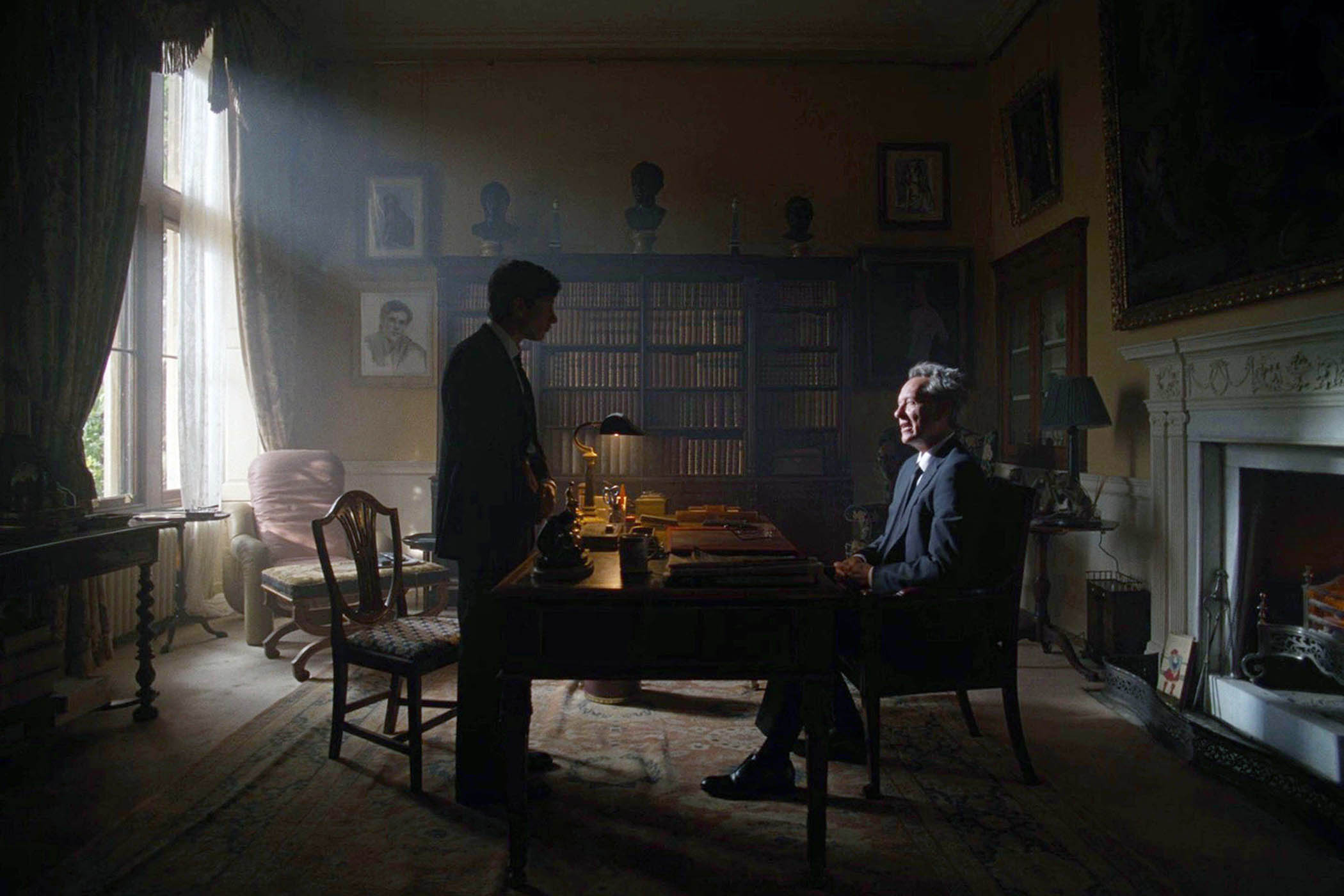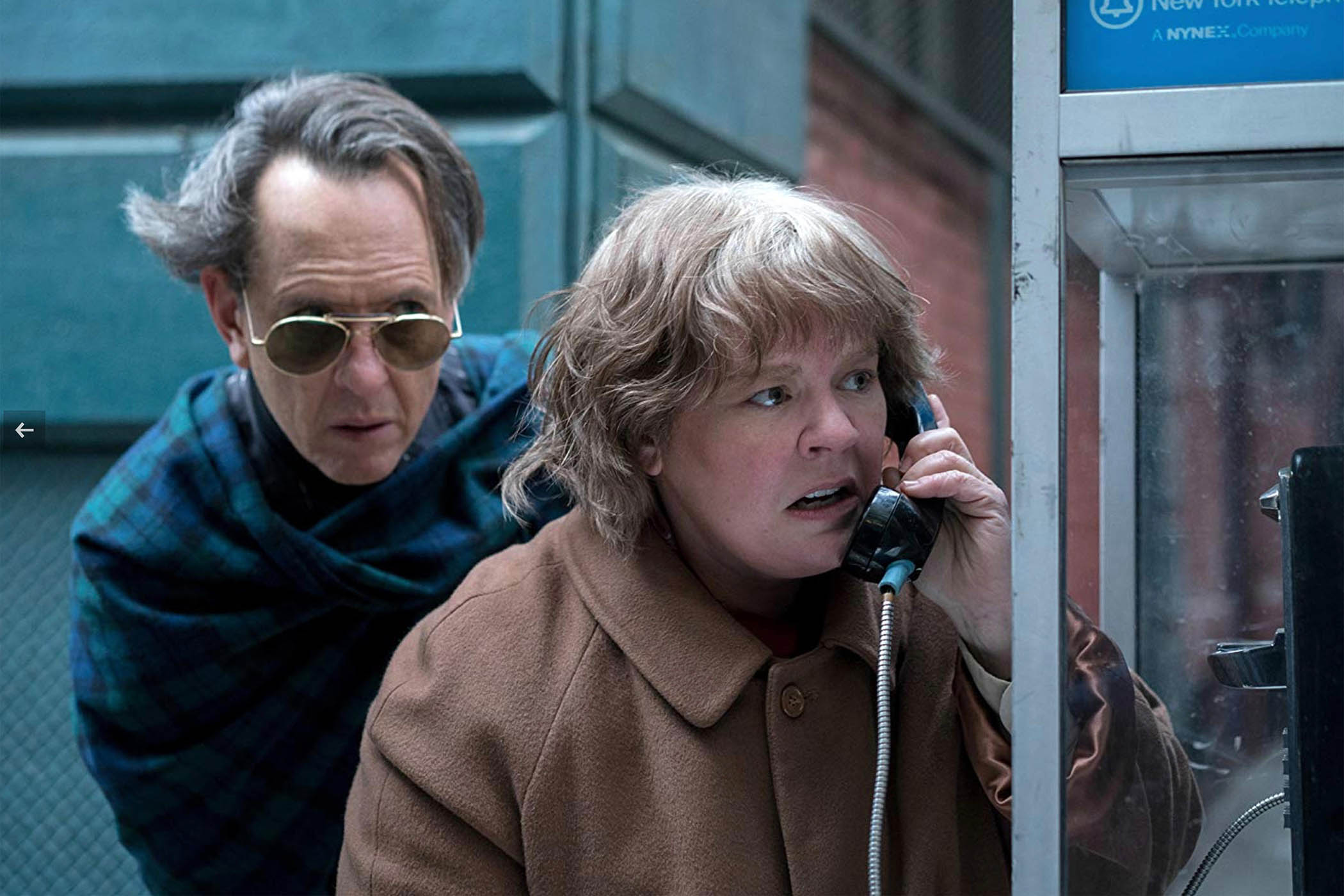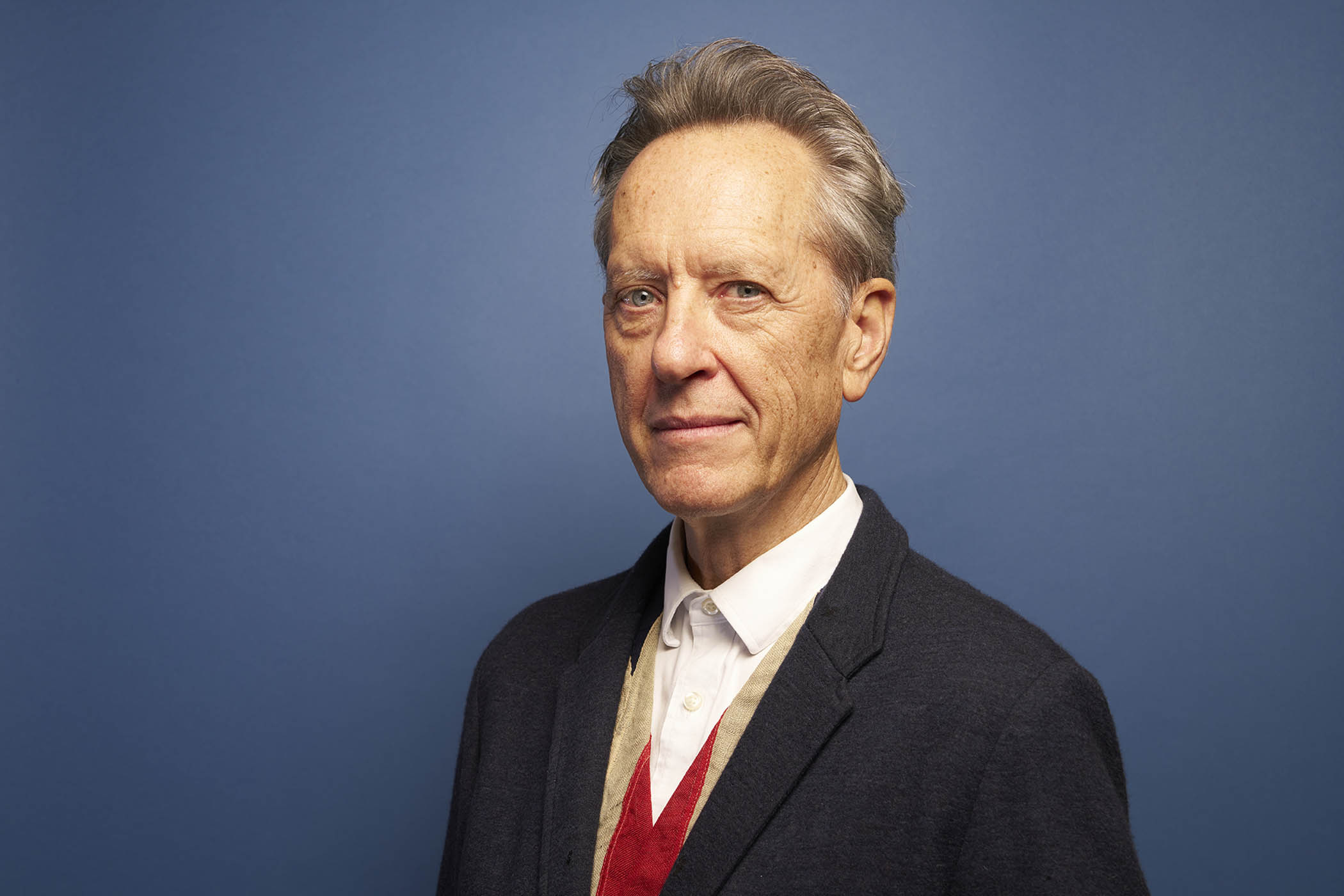Portrait by Suki Dhanda
Richard E Grant would like to put something right – a painting hanging in the London hotel room where I meet him one afternoon in early November. “It’s been skewly put on the wall,” he says. Rising from his chair, he strides across the room, suit jacket flapping atop a union jack waistcoat, and gingerly pulls at one corner of the frame. It doesn’t budge. “God. How terrible.”
This incident, which happens within 30 seconds of meeting Grant, is a taste of the character that has flavoured his screen performances over four decades. The 68-year-old actor made an indelible mark on cinema as a rain-drenched thespian lush in Withnail and I back in 1987, but now, whether an infantile, aristocratic patriarch (Saltburn), a capricious, coked-up advertising exec (Too Much), a longevity-obsessed billionaire (Death of a Unicorn), a violent gangster posing as a florist (The Thursday Murder Club) or a misogynistic medieval god named Birdman (the forthcoming 100 Nights of Hero), Grant has found a new vocation playing punctilious eccentrics.
That eccentricity is cautiously deployed in his new film Nuremberg, a weighty drama about the 1945-46 war crimes trials prompted by the footage from the liberation of the Nazi concentration camps that circulated around the world. The film tells the true story of US army psychiatrist Lt Col Douglas Kelley (Rami Malek), who was brought in to evaluate 22 senior Nazis who were captured, most notably Hitler’s second-in-command, Hermann Göring (Russell Crowe).
Grant plays Sir David Maxwell Fyfe, the British assistant prosecutor working alongside the American lead prosecutor, Robert Jackson (Michael Shannon), to try these men in an unprecedented case. To play Maxwell Fyfe, Grant turned to black and white footage of the trials on YouTube to master the way that his character spoke and moved. “Your responsibility as an actor is to honour that as best you can because they have living relatives,” he says.
Still, he couldn’t resist adding a little Grant flourish to his take on Maxwell Fyfe, who in the film has a habit of tipping a shot of brandy into his teacup during tense conversations. “I didn’t have any footage of him doing that, but the Americans were running the trial, and Michael Shannon’s character is like Mount Rushmore – very, very stern,” he says. “I think you’ve got to have somebody who is of a lighter note, otherwise it’d be too Waldorf and Statler [of Muppets fame] in the balcony, grumping away.”
Kelley’s task was to establish traits that marked the Nazi officers as psychologically different from the rest of humanity, yet he found they were terrifyingly ordinary men who loved their families. “Göring was so charming that, if you had a dinner party of 10 people, you would include him, because he was so magnetic and engaging.”

Richard E Grant, centre, with Michael Shannon, left, and Remi Malek in Nuremberg
Grant says the film made him think differently about notions of good and evil, and about our human instincts to tell the difference. Talk of this leads to another, infinitely more benign kind of human treachery. “I’m obsessed with The [Celebrity] Traitors,” he says. “I was fascinated to see the mega-sized brain of Sir Stephen Fry so frustrated because he just could not work out who it was. You see how easy it is for people to follow the herd.”
We are speaking the morning after the final episode has aired, with Alan Carr surely a future candidate to appear on British bank notes and Joe Marler currently awaiting approval as a citation on the Wikipedia page for great betrayals of history. The second series of The Celebrity Traitors has already been commissioned and is due to run next year. “I think it would be absolutely irresistible,” Grant says, when I ask if he would go on. “Would you?” he asks.
I don’t think so, I say.
“Why? It’s a game,” he says dryly. “You don’t get killed in real life.”
Grant arrived in London from Swaziland, now Eswatini, in 1982 at the age of 25. As a boy he had secretly wished to become an actor, joining a local amateur theatre club. “I let slip that that’s what I wanted to do when I was a teenager and was so mocked and derided,” he says. “Then, not having grown up or gone to university or drama school in England, I arrived here and, again, you’re an outsider but an insider.”
This sense of him as an outsider on the inside has become an interesting feature of Grant’s career. In 2019, he was nominated for an Oscar for playing the literary forger Lee Israel’s accomplice Jack Hock in Can You Ever Forgive Me? Grant didn’t win, but his sharing of endless selfies with his starry contemporaries at high-profile events – less natural high flyer, more gleeful competition hopeful – endeared him to many. “I’ve been star-struck all my life,” he says. “Having grown up in the tiniest country in the southern hemisphere, where there was one cinema and no television at all, I find being among really talented actors, writers and directors the best drug of all.”
He tells me a story about being told off for namedropping on a chatshow that he’d appeared on with Julia Roberts and Sophia Loren. “I was great friends with Carrie Fisher and she said: ‘You really embarrassed yourself. You’re no longer a tourist, Richard. You’re one of the attractions,’” he says. “But that’s not how I feel. I still feel wide-eyed in the sweetshop of Madame Tussauds.”
The all-star cast of Nuremberg, then, was a “great thrill” for Grant; a nice surprise, given “there’s usually somebody that self-appoints themselves as a real irritant”, he says. “The group of actors in this film are pretty stellar. I know so many people say: ‘We were like a family’ – well, family shouldn’t be the guide for that. My family was so dysfunctional that I wouldn’t like to compare any film family that I formed with my real one.”

Grant with Barry Keoghan in Saltburn
Grant is referring to his upbringing in an expat community, a life that, he has said, centred on “boredom, booze and bonking”. When he was 10 years old, he woke up to see his mother having sex with his father’s best friend in the car they were all in. A year later, his parents divorced and his father fell into alcoholism and became verbally and physically abusive. His own family always seem remarkably close and capable of voicing their emotions. “I made up for what I didn’t have before,” he says. “An exact Dr Freud reaction.”
The new film was shot in Budapest, with fluorescent lights in the erected courtroom (replicating the original lighting, which was so bright that several defendants requested sunglasses), meaning that by the end of the day, the cast were frazzled and drained. But rather than slope off separately, they would come together.
Grant compares it to a wake after a funeral because of the effect the horrifying material they had to work with had on them. “It was such a release and a relief for people to let their hair down – or let their short back and sides down – and have a drink and a dance and celebrate the fact that you are alive,” he says. “I think that’s what people do because, otherwise, it would be unbearable.”
For Grant, this outlook may be thanks to a parting gift from his late wife, the acclaimed dialect coach Joan Washington, who, four days before she died of lung cancer in 2021, challenged her husband and their daughter, Olivia, to find a “pocketful of happiness in every day”.
The mantra, which subsequently became the title of a memoir Grant wrote about this period of his life, has carried him forward. “Nobody’s come back, to my knowledge. So go for it and squeeze the pips till they squeak,” he says. “That’s my philosophy.”
As a result, Grant is greatly enjoying the glut of parts playing camp villains and ageing eccentrics that are coming his way. Nowadays, he’s often the oldest on set, apart from, he tells me with his rictus grin, The Thursday Murder Club, where he was one of the youngest.
“I’m glad I didn’t die,” he says of Nuremberg. “The other six parts I played this last year, I’ve died. I’ve had a heart attack, I’ve had a wooden leg. I’ve had another heart attack. I’ve poisoned myself. That’s when you really know. That and the freedom pass from the government with a letter saying ‘old age pensioners’. You can’t say: ‘Well, 68 is the new 48.’ No, it isn’t. You’re just old. Own it.”
In Emerald Fennell’s Saltburn, Grant’s character dies, implicitly by suicide, off-screen, though he came away from the production with a keepsake in the form of a giant proscenium arch from the birthday party of Barry Keoghan’s character. The arch is now in the garden of Grant’s Richmond home, in front of a 2ft-tall sculpture of Barbra Streisand’s head that he had commissioned.
You can’t say: ‘Well, 68 is the new 48.’ No, it isn’t. You’re just old. Own it
But the real parting gift from Saltburn was the appalled reactions from viewers who sat down to stream the film at Christmas with older family members and got a shock at scenes involving grave-humping and bodily fluids.
“I love the fact that Emerald Fennell went on a chatshow and said: ‘Oh, it’s a family film,’” Grant says, before immediately imitating the voice of a splashy tabloid headline. “Grandmother of Tunbridge Wells outraged! Well, understandably, because you don’t want to see sperm being sucked out of a bath hole with your grandchildren on Christmas Eve.”
His Nuremberg role is small but Maxwell Fyfe’s actions were of great historical significance. Under questioning, Göring stumped American prosecutor Jackson by correcting a mistranslation of evidence that he submitted. Göring asserted that it was a complete solution, not a “final solution” that he sought; evacuating Jews from Germany to elsewhere, not eradicating them. Göring maintained that he was not aware of the concentration camps’ purpose beyond being work camps.
While filming this tense cross-examination, Grant’s main feeling, he says, was terror. A day before he was scheduled to shoot the scene, director James Vanderbilt announced that Crowe and Shannon wanted to do the whole 22-page scene in one take. If he flubbed it, they’d go again.
“When it came to it, we did it in a 25-minute take. The audience of 400 Hungarian extras had parents who had lived under the Nazi occupation, followed by the generation living under communist rule. They viscerally knew first-hand what it was like to live under a repressive regime. When my character finally nails Göring, there was total silence, and then this absolutely astonishing standing ovation,” Grant says.
“Somebody cynically quipped: ‘Well, if you were sitting there for 25 minutes, you’d want to stand up and cheer that the thing was over.’ But that wasn’t what happened. It was an amazing thing.”
The film resists having an emotional accompanying score during that moment, instead showing a battle of wills as it happened. “This probably sounds sacrilegious to say, but I cannot imagine that Steven Spielberg would have resisted John Williams having even just one violin playing one note.”
The buildup to this cross-examination is the playing of real recordings from concentration camps in the courtroom. Vanderbilt asked that none of the cast watch anything on YouTube beforehand and then played the footage through once. In the room, Grant says it was “pin-drop silence”; a closeup shot of him watching shows his horror-struck face with a tear running down one cheek. Shannon has said that he was so queasy after watching the footage that he didn’t want the camera on him because he didn’t know what to do with his face.

Grant with Melissa McCarthy in Can You Ever Forgive Me?
“There’s no acting required,” Grant says. “When you see piles of emaciated bodies bulldozed into pits, it is so irrefutable and nightmarish that you think: ‘How could this have happened then, and how can any genocide like that happen again?’ And it does, as we know.”
Grant believes this footage serves as proof of history and a reminder to never forget. “There are conspiracy theorists and Holocaust deniers who will say: ‘This is propaganda.’ Or: ‘This didn’t happen.’ Especially in the moment now, where we’re on the edge of the AI tsunami, the authenticity of what you’re seeing feels irrefutable.”
In hearing how Hitler claimed he could reclaim Germany’s former glories and blaming the country’s problems on a common enemy, it’s hard not to think of the messaging of the surging right wing in the UK.
“The recurring theme is: when in doubt, blame foreigners or blame migrants,” Grant says. “I understand that if [you are told that] if that was taken away, then everything would be sorted out – let’s have Brexit and we won’t have anybody arriving on our shores! Well, the reality is, the reverse has happened. We’ve got more people coming than we had before.”
Does Grant think the Nuremberg trials would be possible today, given our post-truth climate, and the international cooperation that their success hinged upon? “Well, the Hague Convention is still in place as a result of the Nuremberg trials. There are arrest warrants out for the people who you know we’re talking about as we speak,” he says. “I saw on Instagram yesterday the current perpetrators of what’s going on would be arrested if they step foot into those countries. So I take courage from that.”
Grant doesn’t clarify who he means, though on the morning we speak, it is reported that Turkey has issued a genocide arrest warrant for Israel’s prime minister, Benjamin Netanyahu, after an international criminal court arrest warrant for Israeli leaders last November. Grant adds: “The fact you can document everything around you, even with AI, I don’t know that you can really get away with stuff, because you will have to pay for what you’ve done.”
How, then, does he continue to find that pocketful of happiness every day, even while making such an unfortunately timely film, at such a gloomy moment in history?
“I still believe that the majority of people have good intentions and we get fixated on the bad stuff,” he says. “I mean, in your daily life, are you besieged by all the stuff that the news is telling us we should be terrified of? Are you wearing a stab vest? Is your phone chained to your body?”
Grant says that in the last months of his wife’s life, he stopped watching the news and, though the headlines were still in the ether, he relished not “being drip-fed that catastrophe and misery on an hourly basis. I feel liberated that I’m not an armchair general thinking that I’ve got to sort the world out,” he laughs. “It’s a relief.”
Photographs by Sky TV, Alamy

